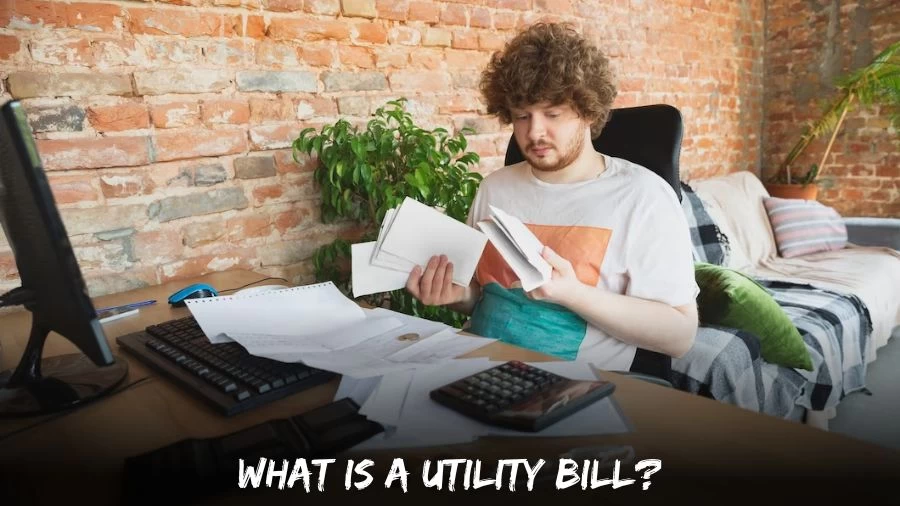
What is a Utility Bill? What is Considered a Utility Bill?
Utility bills encompass charges for essential services like electricity, water, and gas, along with modern conveniences such as waste disposal and communication, while managing costs effectively involves utilizing budgeting tools and following the 50/30/20 rule.
by Sangamithra
Updated Aug 28, 2023
On This Page
What is a Utility Bill?
A utility bill is a recurring monthly document detailing the charges incurred by a household for essential services that contribute to the overall functionality and comfort of a residence. These services encompass fundamental necessities such as electricity, water, and gas. Expanding the scope of utilities may encompass additional amenities like sewage, waste disposal, and recycling services.
Moreover, one might include modern conveniences like television, internet, telephone, and streaming subscriptions as part of the utility framework. Essentially, a utility bill encapsulates the financial summary of charges associated with maintaining a livable and convenient living environment, covering both fundamental utilities and modern technological services that enhance the overall quality of life within a household.
What is Considered a Utility Bill?
A utility bill is a monthly statement that represents the amount a household owes for essential services necessary to maintain a home's operability and comfort. These services typically include:
- Electricity: The cost of the electricity consumed to power lights, appliances, and electronic devices within the home.
- Water: Charges associated with the consumption of water for activities like cooking, cleaning, bathing, and irrigation.
- Gas: The cost of natural gas used for heating, cooking, and other gas-powered appliances.
Depending on the context and the specific needs of the household, utility bills might also encompass additional services such as
- Sewage: Fees for the disposal and treatment of wastewater from the property.
- Trash and Recycling: Charges for garbage collection and recycling services.
- TV, Internet, Phone, and Streaming Services: Monthly fees for entertainment, communication, and connectivity services.
The utility bill provides important information, including the customer's name, address, and account number. It also specifies the total amount owed for the services provided, the due date for payment, and instructions for making payments. Additionally, utility bills often include usage data, detailing the amount of each service consumed during the billing period, and sometimes show usage trends over previous months.
Utility Bill Examples
Utility bill examples encompass various essential services that households commonly pay for on a monthly basis. Here are a few examples of utility bills along with their average costs:
Electric Bill:
- Average Cost: In 2022, the average monthly electric bill among U.S. residences was approximately $137 according to the U.S. Energy Information Administration.
- Usage Tip: To save on electric bills, consider using energy-efficient appliances, investing in a programmable thermostat, and being mindful of turning off lights and electronics when not in use.
Water Bill:
- Average Cost: The average family spends about $83 per month on water costs, which equates to more than $1,000 per year according to U.S. Environmental Protection Agency data updated in 2023.
- Usage Tip: To reduce water bills, address any leaks promptly, consider using water-efficient appliances, and adopt water-saving habits like taking shorter showers and fixing dripping faucets.
Gas Bill:
- Average Cost: In 2021, the average residential gas bill was around $63 per month, totaling about $761 per year. However, actual costs can vary significantly based on location and usage.
- Usage Tip: Monitor your thermostat settings, adjust temperatures when you're away, and ensure the proper insulation of your home to maximize energy efficiency.
It's important to note that the costs mentioned above are averages and can vary based on factors such as geographic location, household size, usage patterns, and energy efficiency measures implemented. Additionally, utility bills can include other services like sewage, trash, recycling, TV, internet, phone, and streaming services, depending on individual preferences and service availability.
Utility Bill Forgiveness California
Utility Bill Forgiveness California refers to the 2022 California Arrearage Payment Program (CAPP), a state initiative aimed at assisting eligible residential customers in settling their outstanding energy utility bills that accumulated during the COVID-19 pandemic.
The program reduces or eliminates the unpaid electric and gas bills of qualified residential customers by directly applying bill credits to their utility invoices. No separate application is required for the 2022 CAPP, as the assistance is automatically provided by state energy utility companies participating in the program. These bill credits are made possible by the State of California.
They are specifically intended to support residential utility customers who faced financial challenges due to the economic impact of the pandemic. To be eligible for a 2022 CAPP credit, customers must have had unpaid energy utility bills for services incurred between March 4, 2020, and December 31, 2021.
Utility Bill Payment Online
To pay utility bills online, you have several options depending on the specific utility company. Here are some common methods:
Utility Company's Website: Many utility companies provide online bill payment options on their websites. You can visit the website of your utility company and look for a "Pay Bill" or "Online Bill Payment" option. You will usually need to create an account and provide your account details to make the payment.
Bank Websites and Apps: Most banks offer online bill payment services through their websites or mobile apps. You can add your utility bill as a payee and set up recurring payments or make one-time payments. Check with your bank to see if they provide this service.
Payment Apps and Services: There are various payment apps and services available, such as PayPal, Venmo, Google Pay, and Apple Pay. Some utility companies accept payments through these platforms. You can check if your utility company supports any of these payment methods.
Are Utility Bills Included in Credit Reports?
Utility bills are generally not a standard feature on credit reports due to the typical practice of utility companies refraining from reporting to the major credit bureaus such as TransUnion, Experian, and Equifax. The majority of utility payments, including those made on time, do not contribute to your credit history or affect your credit score.
However, it's worth noting that if you fail to make payments on time and become delinquent, the situation might change. In such cases, late payments or non-payment to utility companies could potentially be reported to the credit bureaus, consequently affecting your credit report and credit score.
While utility bills themselves might not directly impact your credit, it's essential to manage them responsibly to avoid any negative consequences in the event of non-payment. Maintaining timely payments on your utility bills demonstrates good financial responsibility and helps prevent any potential negative impact on your credit history.
How Do You Budget Effectively for Your Utility Bills?
Budget App: Kick off your effective budgeting journey by downloading a user-friendly budget app. This tool will aid in closely monitoring your payment activities and expenses.
50/30/20 Rule: Embrace the practicality of the 50/30/20 principle. Dedicate half (50%) of your earnings to cover rent and essential utility bills. Allocate 30% for enjoyable extras like vacations and spa days, and ensure 20% goes into savings. This savings portion encompasses emergency funds, retirement accounts, and addressing outstanding debts.
Utility Bills Estimator: Get ahead of your financial planning by using a utility bills estimator. Check out online tools designed to provide a reliable estimate of your upcoming utility expenses.
Following these steps, you'll master the art of budgeting for utility bills, keeping your financial health in check, and allowing room for both future financial security and enjoyable experiences.
What to Do if Utility Bills Unpaid?
If payment becomes unfeasible, potential consequences include late charges, credit score repercussions, and service disruption. However, avenues for resolution exist:
Direct Communication with Provider
- Reach Out to Customer Service: Utilize the Contact Information on Your Bill
- Request for Assistance: Explain Your Situation and Seek Potential Solutions
- Potential Outcomes: Bill Reduction, Deferral, or Waiving Late Fees
Leveraging External Resources
- 211 Network: Connecting to Local Resources and Expert Guidance
- Accessing Help: Visit 211.org or Dial 211 to Explore Available Support
What is a Utility Bill - FAQ
1. What is included in a utility bill?
A utility bill covers charges for essential services like electricity, water, and gas, along with additional amenities such as sewage, waste disposal, and communication services like TV, internet, and phone.
2. Can utility bills affect my credit score?
Generally, utility bills don't impact credit scores. However, late payments or non-payment could potentially be reported to credit bureaus, affecting your credit report.
3. How can I budget for utility bills effectively?
Use budget apps, follow the 50/30/20 rule (50% for necessities, 30% for wants, 20% for savings), and utilize utility bills estimators for accurate planning.
4. What options do I have if I can't pay my utility bills?
Contact your provider's customer service for assistance, explore local resources through 211 network, or consider applying for federal programs like the Low Income Home Energy Assistance Program (LIHEAP).
5. How can I pay utility bills online?
Visit your utility provider's website, log in or create an account, choose the bill payment option, enter payment details, and confirm the transaction. Online payment is secure and convenient.




